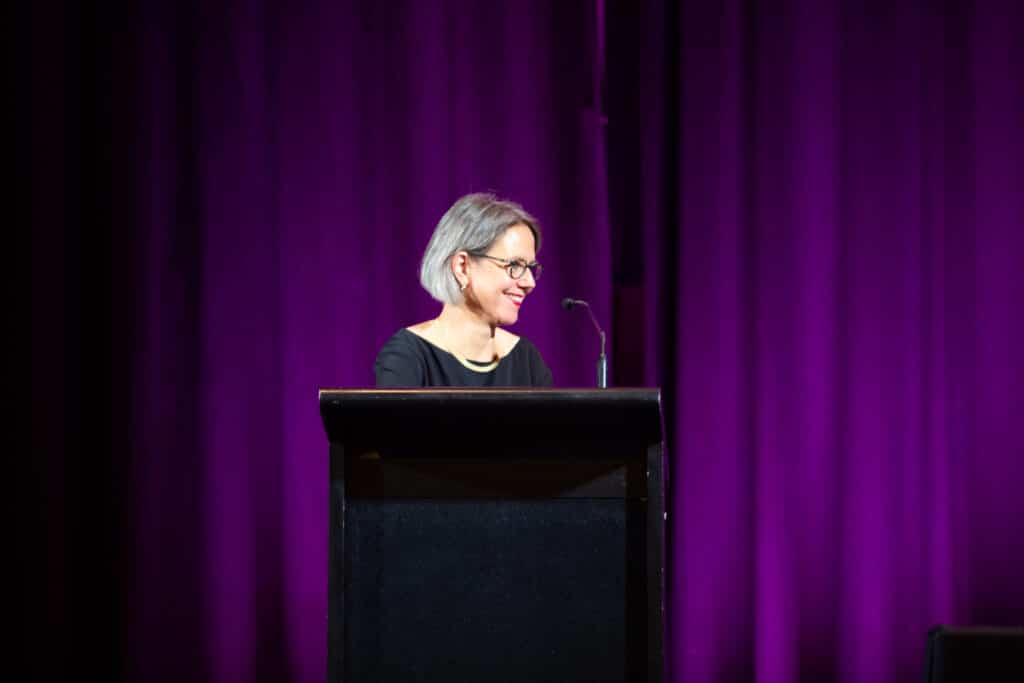Professor Sibylle Loibl is the Chair of the German Breast Group and a Professor of obstetrics and gynaecology at the Goethe University of Frankfurt. Professor Loibl was an international guest speaker at the Breast Cancer Trials 44th Annual Scientific Meeting in Auckland, New Zealand, and we asked her about her research in the area of neoadjuvant treatment for triple negative breast cancer.
“The Breast Cancer Trials conference is obviously very close to my heart because it’s the trials conference, and I’m running a trials group. It’s obvious that we need to exchange across the globe when we run trials together as we learn from each other, and I think that’s the main thing. That’s why I’m here.”
“The keynote presentation I’m giving today is on early triple negative breast cancer and the neoadjuvant treatment in triple negative breast cancer is one of the most important topics, at least to me as well. Not only because it’s relevant for the patients but also because we have recently focused research very much on triple negative breast cancer.”
“Patients have done many analyses in this subgroup and with the germline BRCA carriers coming up, and I think this has a special interest right now in the young women having many triple negative breast cancers. I think this is a very important topic and I’m looking forward to discussing it at the conference.”
Are you looking forward to the Trainee and Early Career Day on Saturday?
“The second topic which I think is important, is the meeting with the young people on Saturday morning at the Trainee and Early Career Day. I’m speaking there about what’s new in early breast cancer. I don’t think it’s very important what I speak about, but I think it’s important to have the interaction with the younger generation, to make them interested in clinical trials and to teach them about clinical trials, and to make them aware.”
“We can only present something or speak about what is new if there was a clinical trial behind what is new. So, I think that’s important in the whole setup of this conference.”
“Nurturing and engaging the younger generation is important because we won’t work and live forever, which is obvious, and I think we need to train them so clinical trials of the same quality will be done in the future as well. And I think that’s why we need to interest them in this research. I think this is important.”
Listen to the Podcast
We spoke with Professor Sibylle Loibl about her research in the area of neoadjuvant treatment for triple negative breast cancer (TNBC).
Why is international collaboration so important?
“International collaboration is also important because, the cancer subtypes and the groups are becoming smaller and smaller. We are doing clinical trials and therefore we cannot run several thousand patient trials on our own in one country anymore.”
“So, we need to collaborate, and we especially need to collaborate with other groups across the globe who have similar ideas and have similar setups. And I think that makes it very important to have this exchange. And this is the challenge in running the clinical trials nowadays.”
“I don’t know really where we are going in the future of breast cancer research. I mean, we have a lot of new drugs coming up. We have new sets of drugs, like the antibody drug conjugates, which fascinates people, and they are particularly fascinating because it’s such an intelligent model of delivering a highly toxic drug to the cells to work against the cancer.”
“And I think they work in many cancers, but I also think the immunotherapy will develop further beyond what we are seeing now, and we may even see a vaccination in the future. And I think we still are not there yet. We still don’t have a cure for cancer, and I think curing cancer is the main aim we all have in the end.”
Support Us
Help us to change lives through breast cancer clinical trials research



